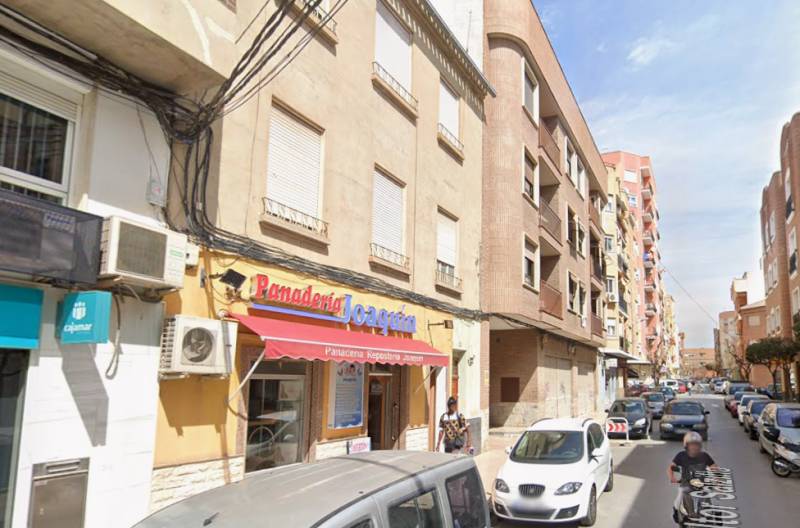- Region
- Águilas
- Alhama de Murcia
- Jumilla
- Lorca
- Los Alcázares
- Mazarrón
- San Javier
-
ALL AREAS & TOWNS
- AREAS
- SOUTH WEST
- MAR MENOR
- MURCIA CITY & CENTRAL
- NORTH & NORTH WEST
- TOWNS
- Abanilla
- Abarán
- Aguilas
- Alamillo
- Alcantarilla
- Aledo
- Alhama de Murcia
- Archena
- Balsicas
- Blanca
- Bolnuevo
- Bullas
- Cañadas del Romero
- Cabo de Palos
- Calasparra
- Camping Bolnuevo
- Campo De Ricote
- Camposol
- Canada De La Lena
- Caravaca de la Cruz
- Cartagena
- Cehegin
- Ceuti
- Cieza
- Condado de Alhama
- Corvera
- Costa Cálida
- Cuevas De Almanzora
- Cuevas de Reyllo
- El Carmoli
- El Mojon
- El Molino (Puerto Lumbreras)
- El Pareton / Cantareros
- El Raso
- El Valle Golf Resort
- Fortuna
- Fuente Alamo
- Hacienda del Alamo Golf Resort
- Hacienda Riquelme Golf Resort
- Isla Plana
- Islas Menores & Mar de Cristal
- Jumilla
- La Azohia
- La Charca
- La Manga Club
- La Manga del Mar Menor
- La Pinilla
- La Puebla
- La Torre
- La Torre Golf Resort
- La Unión
- Las Palas
- Las Ramblas
- Las Ramblas Golf
- Las Torres de Cotillas
- Leiva
- Librilla
- Lo Pagan
- Lo Santiago
- Lorca
- Lorquí
- Los Alcázares
- Los Balcones
- Los Belones
- Los Canovas
- Los Nietos
- Los Perez (Tallante)
- Los Urrutias
- Los Ventorrillos
- Mar De Cristal
- Mar Menor
- Mar Menor Golf Resort
- Mazarrón
- Mazarrón Country Club
- Molina de Segura
- Moratalla
- Mula
- Murcia City
- Murcia Property
- Pareton
- Peraleja Golf Resort
- Perin
- Pilar de la Horadada
- Pinar de Campoverde
- Pinoso
- Playa Honda
- Playa Honda / Playa Paraíso
- Pliego
- Portmán
- Pozo Estrecho
- Puerto de Mazarrón
- Puerto Lumbreras
- Puntas De Calnegre
- Region of Murcia
- Ricote
- Roda Golf Resort
- Roldan
- Roldan and Lo Ferro
- San Javier
- San Pedro del Pinatar
- Santiago de la Ribera
- Sierra Espuña
- Sucina
- Tallante
- Terrazas de la Torre Golf Resort
- Torre Pacheco
- Totana
- What's On Weekly Bulletin
- Yecla


- EDITIONS:
 Spanish News Today
Spanish News Today
 Alicante Today
Alicante Today
 Andalucia Today
Andalucia Today
Active aging: Improving mental and physical health through gardening
Mazarrón Council’s Active aging programme: improving mental and physical health through gardening, launched October 17, 2024
 INTRODUCTION
INTRODUCTION
There have been various reports on the characteristics of physical and emotional development in older people. In studies focused on changes in people's emotion and motivation over the years, the intensity of emotional experience has been analysed with contradictory results.
There is research that supports the idea of less activation of the nervous system, although some studies argue the opposite due to a decrease in the efficiency of homeostatic mechanisms for restoring balance.
Regarding the development of motivation with age, in general there do not seem to be notable changes in the intrinsic motivational conditions of people when they reach old age. Research on motivation has basically focused on the study of its relationship with cognitive functioning and learning. Motivational processes, in terms of self-belief or perception of control, have turned out to be more important variables than external reinforcements in cognitive tasks.
On the other hand, during old age, various life events, such as chronic and debilitating medical conditions, the loss of friends and loved ones, and the inability to participate in activities that were previously enjoyed, can be a very heavy burden on an individual affecting the emotional well-being of an aging person.
An older person may also feel a loss of control over his or her life due to problems with vision, hearing loss, and other physical changes, as well as external pressures such as limited financial resources. These and other issues often result in negative emotions such as sadness, anxiety, loneliness and low self-esteem, which in turn lead to social isolation and apathy.
There is evidence that some natural bodily changes associated with aging may increase a person's risk of experiencing a decreased positive mood. Recent studies suggest that low concentrations of folate in the blood and nervous system may contribute to depression, mental decline, and dementia. Researchers also suspect that there may be a relationship between the onset of depression in old age and Alzheimer's disease.
Regardless of the causes of the different life events that can cause a worsening of the quality of life in the elderly, combating their effects and producing an increase in motivation to carry out activities, both stimulating and leisure, are a primary objective to improve the quality of life of any person.
In this project we unite mental health and physical health through nature and its care.
Since prehistory, humans have used nature for survival, from the domestication of plants in agriculture, through the preparation of medicines, to the therapeutic use of direct contact with the natural environment.
Gardening as such was born in ancient Egypt and Mesopotamia, when bodily and spiritual satisfaction was sought inspired by the presence of plant life in a secluded and quiet space. And it has been shown that the act of planting, pruning and harvesting not only shapes a garden, but also contributes to our physical and emotional well-being.
Although studies on the benefits that gardening provides to the mind and emotions are not new, they were more noticeable after the confinement caused by the covid-19 pandemic. During the quarantine, many people discovered a therapy space, which allowed them to gain a certain sense of control and security, while growing their own food.
The first advantage is the improvement of physical health. Various research projects support the idea that gardening is a great way to exercise. Working in the garden, terrace or orchard involves digging, moving (reasonable) weights, sowing and planting, in addition to watering, mowing, pruning, fertilizing, harvesting... These activities burn calories, improve muscle strength and promote flexibility. A study published by the Swedish School of Sport and Health Sciences found that older adults who gardened had fewer strokes, heart attacks or premature deaths.
"Exercise is the best weapon against aging and gardening is considered an aerobic exercise: it improves metabolism, cardiovascular and osteo-articular (bones and joints) status, and promotes physical, mental and emotional well-being," says Dr. Javier Ortiz, head of Geriatrics at the Hospital. Gregorio Marañón in Madrid. Without forgetting the added advantages of spending time outdoors, in a natural environment that you also work on and help care for.
But the connection with the earth goes beyond the physical, it also nourishes mental and emotional health. In addition, gardening helps to establish connections with other people. Community gardening, in particular, has proven to be an effective tool for social cohesion and building stronger communities
FOCUS PEOPLE, PROFILE AND NUMBER
The projects will be carried out between the months of September, October and November. Registration will be done through the Mazarrón seniors day centre and the town hall website. The venues would be the following: Mazarrón senior day centre and parks and gardens of the Mazarrón Town Council. The talks will be held weekly, scheduled in conjunction with the day centre to prevent this from affecting the development of other ongoing workshops and adapting the schedule for greater attendance.
Launched by Mazarrón Council on October 17 2024, the "Active Aging" project will be promoted in collaboration with the Ministry of Health, FEMP (Federation of Spanish Municipalities and Provinces) and RECS (Spanish Network of Healthy Cities). This programme is aimed at people over the age of 65 and promotes improving mental and physical health through gardening.
A presentation of the project took place on October 8 2024 and at the invitation of Mazarrón Councillor for Health and Camposol, Carmen Navarro, gardening groups from the Camposol urbanisation spoke at the Mazarrón Day Centre for the elderly to explain how to set up and manage a gardening group, this being a novel enterprise in Mazarrón and Spain where such groups are rare.
 The number of beneficiaries over 65 years of age who are members of the Mazarrón Day Centre is 2,000 people, however the target population of this project will rise to 9,217 when including people in the other main urban centres of the municipality.
The number of beneficiaries over 65 years of age who are members of the Mazarrón Day Centre is 2,000 people, however the target population of this project will rise to 9,217 when including people in the other main urban centres of the municipality.
GENERAL AND SPECIFIC OBJECTIVES
1. To improve physical health
a. Increase physical activity: Promote mobility and exercise through gardening activities such as planting, watering, pruning and caring for plants.
b. Strengthen motor coordination: Develop hand-eye coordination and manual dexterity through tasks that require precision and care.
c. Increase muscular endurance and strength: Encourage the use of different muscle groups with garden activities that involve lifting, digging or moving objects, adapting the tasks to the physical abilities of the participants.
2. Stimulate Mental and Cognitive Health
a. Promote memory and attention: Promote the planning and execution of gardening activities that require remembering steps, watering times, or specific care for different plants.
b. Stimulate creativity and decision-making: Provide opportunities for participants to design and organise their gardens, choosing plants, colours and layouts.
c. Reduce stress and anxiety: Create a calm and relaxing environment that allows participants to enjoy nature and the satisfaction of watching their plants grow.
3. Promote Emotional Well-being
a. Foster a sense of purpose and achievement: Help participants experience the satisfaction of caring for and growing plants, which can increase a sense of self-belief and self-esteem.
b. Encourage emotional expression: Create a space where participants can express their feelings and emotions through gardening, finding solace in the growing process.
c. Improve mood: Using interaction with nature and participation in a rewarding activity to improve mood and combat feelings of loneliness or depression.
4. Promote Socialisation and Interpersonal Relationships
a. Promote social interaction: By creating a community environment where participants can work together, share experiences and build relationships.
b. Strengthen the sense of community: By organising group activities, such as collective gardening projects or garden contests, that encourage collaboration and mutual support.
c. Reduce social isolation: Providing opportunities for participants to connect with others, which is essential for mental health in later life.
5. Educate and Raise Awareness about Nature and the Environment
a. Promote environmental education: Teaching participants about plants, the cycle of life, and the importance of sustainability and respect for nature.
b. Promote ecological responsibility: Instil sustainable gardening practices, such as using composting, reducing waste and growing native plants.
c. Raise awareness of the positive impact of nature on health: Help participants recognize and appreciate the benefits that interaction with the natural environment has on their well-being.
6. Facilitate Adaptation and Active Aging
a. Promote independence: Encourage self-management of gardening tasks, adapting activities so that participants can perform them with little or no assistance.
b. Adapt activities to individual abilities: Design tasks that are accessible to everyone, including options for people with reduced mobility or specific health conditions.
c. Promote resilience and adaptation to change: Use gardening as a means to help participants adapt to the physical and emotional changes that accompany aging, providing them with an activity they can enjoy for many years.
METHODOLOGY
It will be an open and dynamic methodology in which participants can address their own experiences and present different problems in their daily lives, promoting group cohesion, unity and an atmosphere of recreation and fun.
The methodology is based on the active aging model in which older people are considered active, independent and participatory people. Following the following principles:
- The principle of self-realisation, which recognises that older people have the permanent right to seek opportunities to strengthen their capacities, through education, training, employment opportunities and the possibility of actively participating in community affairs.
- The principle of independence, which recognizes the desire of older people to maintain their autonomy for as long as possible.
- The principle of participation, which implies that the needs and capacities of older people must be considered in the planning and execution of all local, municipal and regional initiatives, planning and execution of any activity or project that is directed at them, including programs to promote active aging.
- The principle of dignity, which reaffirms that older people should not be belittled or treated with less respect. Regardless of your age, level of vulnerability or disability.
- The principle of care, which reaffirms the right of older people to be supported, to intervene in the decision about the type of care they want and need and to be cared for with consideration
APPLICABLE RESOURCES
For the development of the project, the need for the following resources must be taken into account:
- Health psychologist.
- Health specialist (physiotherapist, nurse, occupational therapist or optician).
- Infrastructure in which to carry out the activities, which would be the Day Centre for seniors and the parks and gardens of the Mazarrón town hall.
- Technological material such as a computer and projector with which to project presentations, as well as other audio-visual materials.
- Expendable material, such as papers, pens, etc., for carrying out certain activities.
To join the programme register at the Centro de Dia de Personas Mayores, Calle Pelayo, 2A, 30870 Mazarrón.
For more local news, events and other information go to the home page of Mazarrón Today
Cartagena
El Carmoli
Islas Menores and Mar de Cristal
La Manga Club
La Manga del Mar Menor
La Puebla
La Torre Golf Resort
La Union
Los Alcazares
Los Belones
Los Nietos
Los Urrutias
Mar Menor Golf Resort
Pilar de la Horadada
Playa Honda / Playa Paraiso
Portman
Roldan and Lo Ferro
San Javier
San Pedro del Pinatar
Santa Rosalia Lake and Life resort
Terrazas de la Torre Golf Resort
Torre Pacheco
Aledo
Alhama de Murcia
Bolnuevo
Camposol
Condado de Alhama
Fuente Alamo
Hacienda del Alamo Golf Resort
Lorca
Mazarron
Puerto de Mazarron
Puerto Lumbreras
Sierra Espuna
Totana
Abaran
Alcantarilla
Archena
Blanca
Corvera
El Valle Golf Resort
Hacienda Riquelme Golf Resort
Lorqui
Molina de Segura
Mosa Trajectum
Murcia City
Peraleja Golf Resort
Ricote
Sucina
Condado de Alhama
El Valle Golf Resort
Hacienda del Alamo Golf Resort
Hacienda Riquelme Golf Resort
Islas Menores and Mar de Cristal
La Manga Club
La Torre Golf Resort
Mar Menor Golf Resort
Mazarron Country Club
Mosa Trajectum
Peraleja Golf Resort
Santa Rosalia Lake and Life resort
Terrazas de la Torre Golf Resort
La Zenia
Lomas de Cabo Roig

CAMPOSOL TODAY Whats OnCartagena SpainCoronavirusCorvera Airport MurciaMurcia Gota Fria 2019Murcia property news generic threadWeekly Bulletin






























